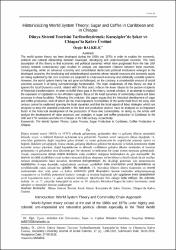| dc.contributor.author | Balkılıç, Özgür | |
| dc.date.accessioned | 2023-12-08T14:08:39Z | |
| dc.date.available | 2023-12-08T14:08:39Z | |
| dc.date.issued | 2018 | en_US |
| dc.identifier.issn | 1303-0094 | |
| dc.identifier.issn | 2149-5459 | |
| dc.identifier.uri | https://doi.org/10.21547/jss.380759 | |
| dc.identifier.uri | https://hdl.handle.net/20.500.12573/1858 | |
| dc.description.abstract | The world system theory has been developed during the 1960s and 1970s in order to explain the economic, political and cultural relationship between developed, developing and underdeveloped countries. The main assumption of this theory is that economic and political dynamics which have progressed from the late 16th century towards contemporary ages resulted in unequal and dependent relations between these countries. Consequently, while an advanced economy and consolidated democratic-political institutions emerged in the developed countries, the developing and underdeveloped countries whose natural resources and economic assets are being exploited by the core countries are subjected to a backward economy and politically unstable systems. However, the world system theory has not gone unchallenged; on the contrary, a considerable amount of social scientists accused it of being overwhelmingly functionalist. The main weaknesses of this theory are that it ignores the local Dynamics and it, related with the first point, reduces the lower classes to the passive recipients of historical transformations. In order to fulfill these gaps in the theory, several scholars, in an attempt to explain the expansion of capitalism in non-Western regions, focus on the local dynamics of commodity chains and labor processes in these localities. Following this criticism, this paper argues that the historical development of sugar and coffee production, both of which are the most important commodities of the world trade from the early 16th century cannot be explained ignoring the local dynamics and that the local aspect of labor strategies which are designed to keep the potential producers in the land and production process must be analyzed as an important factor in the historical development of the production of these two commodities. In doing so, the article will analyze the development of labor processes and strategies in sugar and coffee production in Caribbean in the 16th and 17th centuries and Mexico-Chiapas in the 19th century, respectively. | en_US |
| dc.description.abstract | Dünya sistemi teorisi 1960’lı ve 1970’li yıllarda gelişmemiş, gelişmekte olan ve gelişmiş ülkeler arasındaki iktisadi, siyasi ve kültürel ilişkileri açıklamak için geliştirildi. Teorinin temel varsayımı dünya ölçeğinde 16. yüzyıldan günümüze değin meydana gelen iktisadi ve siyasi gelişmelerin bu coğrafyalar arasında eşitsiz ve bağımlı ilişkilere yol açtığıydı. Sonuç olarak, gelişmiş ülkelerde gelişkin bir ekonomi ve köklü demokratik-siyasi kurumlar ortaya çıkarken, doğal kaynaklarına ve iktisadi varlıklarına gelişkin ülkeler tarafından el konulan gelişmemiş ve gelişmekte olan ülkelerde geri bir ekonomi ve istikrarsız bir siyasi sistem meydana gelmektedir. Ancak, araştırmacılar dünya sistemi teorisinin ciddi eksikleri olduğunu belirtmekten de geri durmadılar. Bu teorinin en ciddi eksiklikleri yerel tarihsel süreçleri dikkate almaması ve bu noktayla ilintili olarak da alt sınıfları tarihsel dönüşümlerin basit nesneleri durumuna indirgemesiydi. Bu eksikliği gidermek için araştırmacılar kapitalizmin Avrupa dışındaki coğrafyalarda yayılışını açıklarken meta zincirlerinin yerel dinamiklerine ve yerelliklerdeki emek süreçlerine eğildiler. Bu makalede, 16. yüzyıldan itibaren dünya ticaretinin en önemli metalarından ikisi olan şeker ve kahve üretiminin yerel dinamikleri hesaba katmadan anlaşılamayacağı vurgulanıyor ve özellikle potansiyel üreticiyi toprağa ve üretime bağlamak için uygulanan emek stratejilerinin yerel boyutlarının kahve ve şeker üretimini belirleyen faktörlerden biri olduğu iddia ediliyor. Bu anlamda, makale 16. ve 17. yüzyılda Karayipler’de şeker ve 19. yüzyılda Meksika-Chiapas’da kahve üretiminde emek süreçleri ve stratejileri üzerine odaklanıyor. | en_US |
| dc.language.iso | eng | en_US |
| dc.publisher | Gaziantep Üniv. Sosyal Bilimler Enst. | en_US |
| dc.relation.isversionof | 10.21547/jss.380759 | en_US |
| dc.rights | info:eu-repo/semantics/openAccess | en_US |
| dc.subject | The World System Theory | en_US |
| dc.subject | Labor Process | en_US |
| dc.subject | Sugar Production in Caribbean | en_US |
| dc.subject | Coffee Production in Chiapas | en_US |
| dc.subject | Dünya Sistemi Teorisi | en_US |
| dc.subject | Emek Süreci | en_US |
| dc.subject | Karayipler’de Şeker Üretimi | en_US |
| dc.subject | Chiapas’da Kahve Üretimi | en_US |
| dc.title | Historicisizing World System Theory: Sugar and Coffee in Caribbean and in Chiapas | en_US |
| dc.title.alternative | Dünya Sistemi Teorisini Tarihselleştirmek: Karayipler’de Şeker ve Chiapas’ta Kahve Üretimi | en_US |
| dc.type | article | en_US |
| dc.contributor.department | AGÜ | en_US |
| dc.contributor.authorID | 0000-0001-6929-2548 | en_US |
| dc.contributor.institutionauthor | Balkılıç, Özgür | |
| dc.identifier.volume | 17 | en_US |
| dc.identifier.issue | 4 | en_US |
| dc.identifier.startpage | 1298 | en_US |
| dc.identifier.endpage | 1310 | en_US |
| dc.relation.journal | Gaziantep Üniversitesi Sosyal Bilimler Dergisi | en_US |
| dc.relation.publicationcategory | Makale - Ulusal Hakemli Dergi - Kurum Öğretim Elemanı | en_US |


















